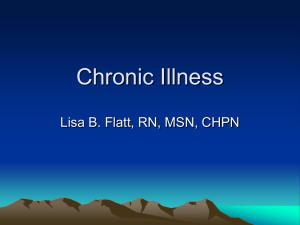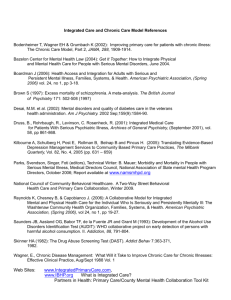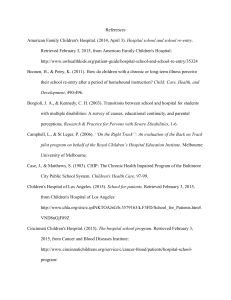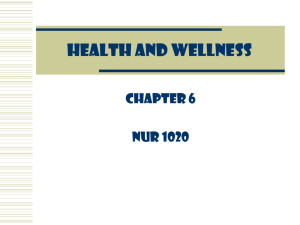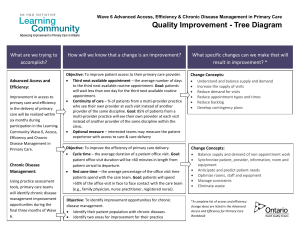Syllabus NP III - The University of Akron
advertisement
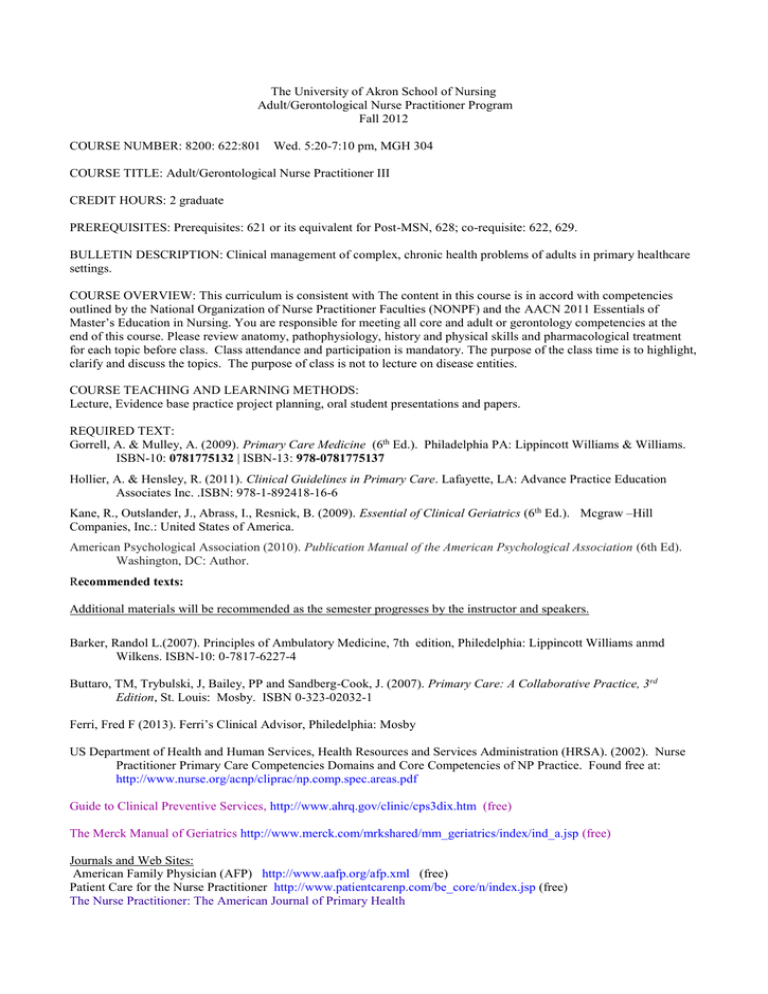
The University of Akron School of Nursing Adult/Gerontological Nurse Practitioner Program Fall 2012 COURSE NUMBER: 8200: 622:801 Wed. 5:20-7:10 pm, MGH 304 COURSE TITLE: Adult/Gerontological Nurse Practitioner III CREDIT HOURS: 2 graduate PREREQUISITES: Prerequisites: 621 or its equivalent for Post-MSN, 628; co-requisite: 622, 629. BULLETIN DESCRIPTION: Clinical management of complex, chronic health problems of adults in primary healthcare settings. COURSE OVERVIEW: This curriculum is consistent with The content in this course is in accord with competencies outlined by the National Organization of Nurse Practitioner Faculties (NONPF) and the AACN 2011 Essentials of Master’s Education in Nursing. You are responsible for meeting all core and adult or gerontology competencies at the end of this course. Please review anatomy, pathophysiology, history and physical skills and pharmacological treatment for each topic before class. Class attendance and participation is mandatory. The purpose of the class time is to highlight, clarify and discuss the topics. The purpose of class is not to lecture on disease entities. COURSE TEACHING AND LEARNING METHODS: Lecture, Evidence base practice project planning, oral student presentations and papers. REQUIRED TEXT: Gorrell, A. & Mulley, A. (2009). Primary Care Medicine (6th Ed.). Philadelphia PA: Lippincott Williams & Williams. ISBN-10: 0781775132 | ISBN-13: 978-0781775137 Hollier, A. & Hensley, R. (2011). Clinical Guidelines in Primary Care. Lafayette, LA: Advance Practice Education Associates Inc. .ISBN: 978-1-892418-16-6 Kane, R., Outslander, J., Abrass, I., Resnick, B. (2009). Essential of Clinical Geriatrics (6th Ed.). Mcgraw –Hill Companies, Inc.: United States of America. American Psychological Association (2010). Publication Manual of the American Psychological Association (6th Ed). Washington, DC: Author. Recommended texts: Additional materials will be recommended as the semester progresses by the instructor and speakers. Barker, Randol L.(2007). Principles of Ambulatory Medicine, 7th edition, Philedelphia: Lippincott Williams anmd Wilkens. ISBN-10: 0-7817-6227-4 Buttaro, TM, Trybulski, J, Bailey, PP and Sandberg-Cook, J. (2007). Primary Care: A Collaborative Practice, 3rd Edition, St. Louis: Mosby. ISBN 0-323-02032-1 Ferri, Fred F (2013). Ferri’s Clinical Advisor, Philedelphia: Mosby US Department of Health and Human Services, Health Resources and Services Administration (HRSA). (2002). Nurse Practitioner Primary Care Competencies Domains and Core Competencies of NP Practice. Found free at: http://www.nurse.org/acnp/cliprac/np.comp.spec.areas.pdf Guide to Clinical Preventive Services, http://www.ahrq.gov/clinic/cps3dix.htm (free) The Merck Manual of Geriatrics http://www.merck.com/mrkshared/mm_geriatrics/index/ind_a.jsp (free) Journals and Web Sites: American Family Physician (AFP) http://www.aafp.org/afp.xml (free) Patient Care for the Nurse Practitioner http://www.patientcarenp.com/be_core/n/index.jsp (free) The Nurse Practitioner: The American Journal of Primary Health Journal of the American Medical Association National Guideline Clearinghouse http://www.guideline.gov/index.asp The American Geriatrics Society: http://www.americangeriatrics.org/ Chronic care: http://www.improvingchroniccare.org/ The Mobile Lipid Clinic: http://www.mobilelipidclinic.com/FreeCalcs.htm Medscape.com NONPF.com for adult/gero NP competencies Assessment skills websites: http://www.med-ed.virginia.edu/courses/pom1/videos/index.cfm http://aamm.unm.edu/new_getpage.php?h_id=3 National Guideline Clearinghouse evidenced based guidelines: http://www.guideline.gov/ FACULTY: Carolyn Sutter BSN, MSN, RN, Office: MGH 201-E, 330-972-2437 Cell 330-575-7864 E-mail: csutter@uakron.edu Office Hours: Wed. 3-5 pm or by appointment OFFICE OF ACCESSIBILITY: If any student has special needs in terms of test-taking, building access, procedures, etc., he or she must notify course faculty within two weeks of the first day of the course. Written, professional documentation must be provided. It is the responsibility of each student to identify him/herself to the Access Office and to request accommodations, if they are necessary. Appropriate documentation is required before eligibility is determined. Provisions of accommodations will then occur if students are eligible for services. Please contact the Access Office for information on documentation requirements at 330-972-7928 (v), 330-972-5764 (tdd) or www.uakron.edu/access. ATTENDANCE POLICY: Attendance is mandatory for all class activities. STUDENT CODE OF CONDUCT Students must follow University and College of Nursing policies as stated in the student handbook. The Student Code of Conduct, can be found at www.uakron.edu/sja or by visiting the Office of Student Judicial Affairs, Student Union. The Graduate Bulletin is the guide to many situations. The policies/procedures/information listed within must be followed. CODE OF ETHICS Code of Ethics for Nurses with Interpretive Statements provides a framework for nurses to use in ethical analysis and decision-making. The Code of Ethics establishes the ethical standard for the profession. It is not negotiable in any setting nor is it subject to revision or amendment except by formal process of the House of Delegates of the ANA. The Code of Ethics for Nurses is a reflection of the proud ethical heritage of nursing, a guide for nurses now and in the future. GRADING SCALE: A 94-100 A- 90-93 C+ 77-79 C 74-76 B+ 87-89 C- 70-73 B 84-86 D+ 67-69 B- 80-83, D 64-66 D- 60-63 F <62 ACADEMIC DISHONESTY POLICY Any student found to be cheating on an exam, test or quiz will receive a grade of zero for the exam, test or quiz. The student will also receive a failing grade for the course. In addition, the student (and situation) will be referred to the University of Akron Judicial Affairs with the recommendation for dismissal from the College of Nursing. Students who plagiarize will be dealt with in the same manner. Definition of plagiarism can be found on http://www.uakron.edu/ogc/PreventiveLaw/plagiarism.php COURSE OUTCOMES 1. 2. 2. 3. Chronic Illness Model Gero presentation Chronic Illness Paper Capstone Project IRB CITI course certificate, 5% 5% 30% 50% 5% 6. 7. Capstone preparation 5% Presentation: Capstone Power point 20% Capstone paper 20% Preparation, attendance, participation and professional behavior. Participation in Interdisciplinary Conference 5% 5% Total 100% GUIDELINES FOR ASSIGNMENTS 1. Chronic Illness Paper Choose to analyze a chronic illness diagnosis. Select a geriatric population and consider a common co-morbid issue associated to this chronic illness and which affects the patient’s quality of life. Include at least one example of a patient to illustrate the concepts. Analyze the current research evidence on this topic. Incorporate the chronic care model by Dr. Wagner. Describe how the advanced practice nurse (you) can and perhaps did make a difference in the care of persons with this disease. This should be base on research already published. Include NONPF competencies in this description. Describe community services, home care, ADL, patient education, and Self Care needs. At least 6 references should be used. Maximum 10-page double-spaced paper. The paper should be a quality suitable for publication in an advanced practice journal. This is a formal paper and should be typed, double spaced with an abstract and cover page. Correct grammar and spelling is expected. Headings should be used for the major divisions of your paper. For references, APA 6th Ed. Style is required. Include a specific research question that still is not answered and is an area where further study is needed. The topic must be preapproved. The topic must be different from your capstone project. Chronic Illness Paper Grading Criteria Name: Date: Title: Description of Chronic illness and a common concern in this population. A co-morbid 1. diseases, or it may be physical, psychological, emotional, social, financial, spiritual or practical. This clinical presentation affects the patient’s quality of life, or ability to “COMPLY” with the plan of care. 2. Prevalence or epidemiological summary. 3. 4. 5. 6. 7. Summary of the current research in this area, Diagnostic Criteria Disease Management, Medications, Diagnostic Testing as needed to make you r point. Appendixes are OK for charts, guidelines, etc. This area should include specific research studies, the population description, size (n =) and the results NEED EVIDENCE BASED PRACTIOCE AND CHRONIC CARE MODEL. Include at least one example of a patient to illustrate the concepts Goal 5 to Improve Care: An idea to improve the care of patients with this chronic illness are discussed with references and research as support. Include Patient Education and Community and or public health resources. A new research question is described for this issue. (Paragraph) What did I learn doing this paper? I recommend changing or continuing what aspects of this assignment for next year. (one Paragraph) Points Grade 10% 10% 20% 10% 20% 10% 10% 10% 8. On time, APA format, correct grammar and spelling Instructor Comments: 100% 2. Inter-professional Conference on Metabolic syndrome: Primary Care of a person with severe and persistent Mental Illness. Participate with the NEOCOM Medical students and pharmacy and medicine professors Drs. Munetz, Costa and Paxos. Please come prepared by reading the case and two articles and participating in the discussion. The class includes a didactic lecture and a tour of the Primary Care Facility. It is a nice opportunity for students to see a community based facility and consider as a clinical site. Please read the 4 articles in on Springboard preparation: 1. Primary Care issues in Patients with Mental Illness 2. Inter-professional psychiatry case 3. Antipsychotics consensus guideline 4. Mental health and Primary care powerpoint Attendance will be taken. Make a Sign in sheet and bring it back to class. Dates Aug. 29, Oct 10, Nov. 28 (OSCE), Jan. 16, 2013, Feb. 13, 2013, April 10, 2013 All start at 3-5pm at Community Support Services, Inc. (Corner of Cross and Wolf Ledges Parkway) in the Conference Room #1 downstairs, 150 Cross Street, Akron, Ohio 44311 3. Capstone requires all students demonstrate Student Citi Training https://www.citiprogram.org/Default.asp? Tutorial for students taking the CITI Training for a course Requirement http://www.uakron.edu/research/orssp/docs/CITIStudentTutorial.pdf Capstone and Chronic Illness paper meeting document Bring a completed copy of this to meet with your instructor to plan your Chronic illness paper and capstone project. Name:_________________ NPII Paper Topic/Title:_ Meeting date:_____________________ Chronic Illness Paper topic: Comorbidity: Any Questions: Date Approved: Capstone report: Topic: Research question: Population: Human subjects /IRB: Instrument: Methods: Any Questions: Date Approved: Meeting date:_____________________ COURSE CALENDAR Fall 2012 Adult/Gerontological Health Nursing NP III - Fall 2012 Date Class - Topic Preparatory Assignments Wednesday 5:30 - 7:20 pm 8/29/12 Orientation to 622 and 629 course 8/29 Metabolic syndrome and Week 1 assignments/expectations Psychotropic’s Interdisciplinary conference Research in Improving Chronic 3:00 pm @CSS Resources chemical Illness Care, Healthcare dependence and other Community Agencies disparities Alternate date: Oct 10, Nov. 28 (OSCE), Management of Chronic illness Jan. 16, 2013, Feb. 13, 2013, April 10, 2013 and comorbities in primary care Look up Part I The Chronic Care Model, Dr. NONPF competencies E. Wagner and summarize in a page double spaced. 9/5/12 Chronic Illness paper topics Discussion of Assignment Chronic Care Week 2 Capstone Project research Design Model and Instrument Choices, IRB Chronic care model summary and OSCE write-up due 9/12/12 Chronic Illness management Differential diagnosis and diagnostic criteria Week 3 Capstone Project reviewed Differential Diagnosis 9/19/12 PICOT Questions for Evidence Chronic Illness paper topic due and Week 4 Base Practice Capstone Summary Due and Citi Training Due 9/26/12 Research methods for capstone Borrow EKG DVD from C Sutter. Week 5 10/3/12 EKG rhythm strips only Week 6 10/10/12 Palliative and Hospice Care Interdisciplinary conference 3:00 pm @CSS Week 7 Ethical issues Mellagari CNP 10/17/12 Chronic Pain Guest lecture Week 8 10/24/12 Discussion Chronic Illness papers Chronic Illness Paper Due : Be prepared Week 9 to give a synopsis of your paper, informal class discussion 10/31/12 Discussion Chronic Illness papers Be prepared to give a synopsis of your paper, Week 10 informal class discussion 11/7/12 Complex Patient Management Fosters a trusting relationship: Frail elderly, Week 11 and Gero issues violence, abuse, and mistreatment, Loss functional ability, malnutrition, falls a. suicide prevention, b. sexually-related issues c. substance use/abuse, risk-taking behavior e. safety, driving, aids to maintain finances, POA independence 11/14/12 Chronic Wounds Valerie Sisson MSN, CNP Week 12 11/21/12 No Class Thanksgiving Week 13 11/28/12 OSCE Work on you Capstone Projects Week 14 Interdisciplinary conference 3:00 pm @CSS 12/5/12 Capstone Project presentations, CAPSTONE PAPER and Power point DUE Week 15 15minutes each 12/12/12 FINALS WEEK Course evaluation Look up Chronic Care Model and summarize in a page double spaced. http://www.improvi ngchroniccare.org/ change/model/mod eltalk.html Kane Ch.4 Kane Ch. 5 ___________ Will be at the end of evening 9:00 Kane Ch. 17 Lecture on Will be tested in 692 Kane Ch. 15-16 Lecture Will be tested in 692 Carolyn Sutter, Instructor Adult/Gero Nurse Practitioner III (8200:622) and IV (8200:624) Capstone Project The project is planned in the fall semester and data collection is done between November and March. The capstone experience is designed to provide an opportunity to empower students to improve quality and safety of primary care. Students utilize national guidelines from the Agency for Health Care Research and Quality when making clinical practice decisions. Targeted Learning Outcomes: Nurse Practitioner students will demonstrate: 1. Critical thinking skills to provide safe, high quality care. 2. Professional writing and speaking skills. 3. Collaborative leadership in clinical practice. 4. Promotion of research and the clinical application of evidence based practice. 5. Confidence tempered with caution and compassion. Directions: 1. All projects will be pre-approved by the instructor, Carolyn Sutter and the clinical preceptor, Physician or nurse practitioner in the clinical site where data will be collected. 2. All student will complete CITI training for human subjects 3. No high risk populations, specifically no pediatric or adolescent subjects. 6. No intervention outside of the scope of practice of a student nurse practitioner. Activities: The Capstone is a three semester individual project implementing one Evidence Based Practice. Students observe a disparity in clinical practice and write a literature review the first semester. The Chronic Care Model is introduced in the second semester. Each student chooses or creates a checklist or instrument for use with a specific population based on national guidelines and current research. The third semester requires implementation, evaluation and dissemination. The student is responsible for project planning, implementation and evaluation of patient outcomes. Scholarly papers and oral or poster presentations are required both in class and at a Research Conference. Examples of student projects include: A chart to follow the American Diabetes Association recommendations for regular appointments, The Framingham study guidelines to evaluate cardiovascular risk. 1. Each student should select an outcome instrument for a primary care entity and have it approved by faculty. 2. Describe the tool and its source, reliability and validity if known, and the research, guideline recommending its use as Evidence Based Practice Perform. Reference the literature for the instrument and methods recommended. 3. Experiences are shared in class discussion which allows the students exposure to multiple clinical applications of Evidence Based Practice. 4. Evaluation is based on the appropriate application of the research and/or national guidelines. 5. The Capstone assignment is graded through a formal written paper, orally via an in class power point presentation and in the professional role through participation in a formal research presentation, oral or poster, or submitted for publication Fall Semester Capstone Requirements; 1. Choose one chronic illness and a measurable patient outcomes based on scientific evidence. Topics and instruments must be approved in advance with the instructor, C Sutter. 2. Decide on an instrument or create one to improve the patients’ outcome. You may use patient education or assessment instruments, the electronic or paper medical record, the or information management system.. The topic must be applicable for use in primary care. You should be continuing the topic of the critical thinking paper done in NPII. Refinement and adjustment of this topic will be discussed individually with C. Sutter. All projects will be pre-approved and MUST COMPLY WITH UA IRB REQUIREMENTS! 3. If you chose to change topics from the paper done in NPII, then you must write your chronic illness paper this semester on this topic to complete the literature review. 4. The project MUST include an instrument used to measure outcomes of PROCESS or PATIENT‘s response to its use. The formal presentation is a HOW TO use the instrument lesson for the class. This should include a brief summary of the current literature recommending this intervention. This is a major graduate project and is a reflection of your critical thinking and ability to influence the current science through your intervention to improve your own clinical practice. 5. In the spring semester, the instrument should be used in clinical practice to evaluate its benefit. The results of this will be presented at a professional conference either as an oral or poster presentation, or written formally id a publishable paper. 6. CITI training report 7. UASIS April 2013 in student union
